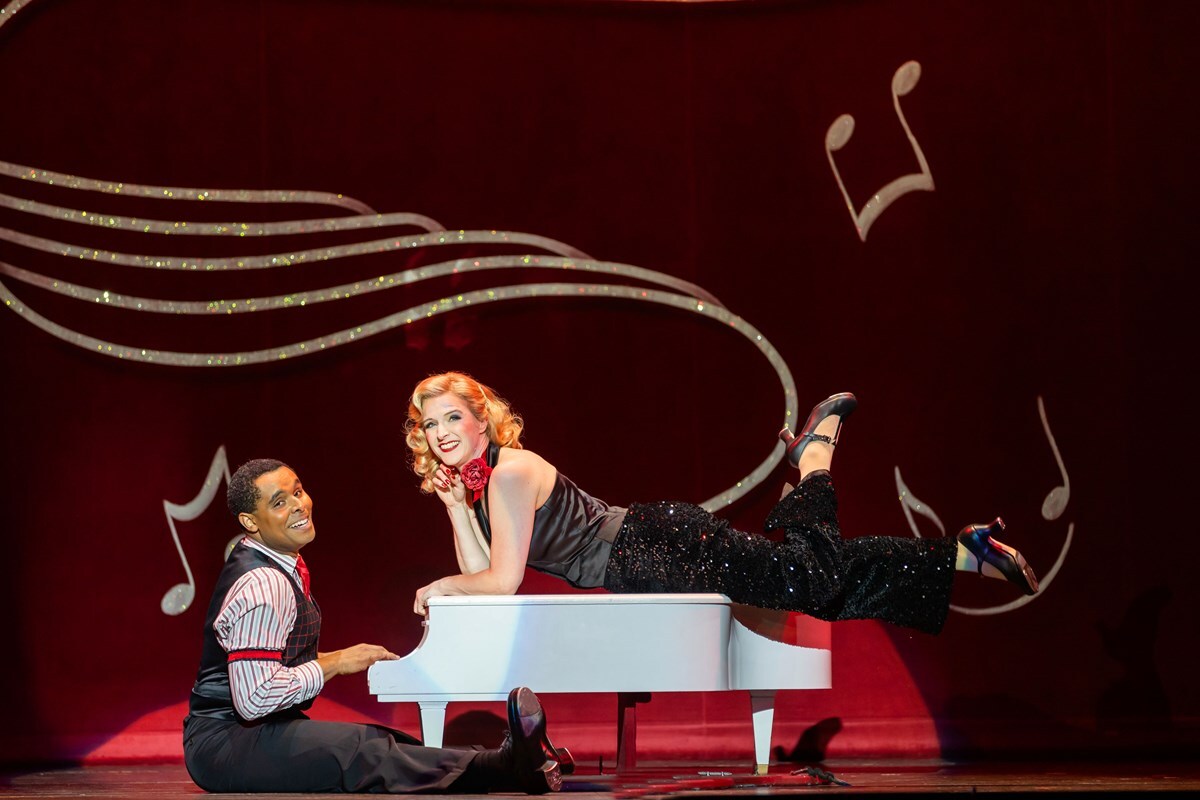Irving Berlin’s White Christmas: Nostalgic, If Not Timeless
Review of Irving Berlin’s White Christmas at Fifth Avenue Theater
Written by TeenTix Newsroom Writer Lorelei Schwarz and edited by Teen Editorial Staff Member Kyle Gerstel

When the faux snowflakes drift into the audience during the finale of Irving Berlin’s White Christmas from the 5th Avenue Theatre, it’s impossible to deny the magic of this show, the cable-knit sweater coziness of it all. Unfortunately, the chances of it snowing outside are slim to none, but you walk out of the theater convinced that life leans toward the magical, expecting a blanket of white to cover the city streets.
White Christmas, a stage adaptation of the 1954 movie musical of the same name, features holiday classics and angsty love songs alike. In the show, World War II veterans-turned-star singing duo Bob Wallace and Phil Davis decide (well, Phil decides and Bob is reluctantly dragged along) to follow another singing duo, the Haynes sisters, to Vermont.
From the pre-show horn blaring from the pit to that final snowy moment, this is a show that delights in its theatricality. The story is cheesy and the characters are, for the most part, Hallmark movie-levels of nuanced, but isn’t that what we want from a holiday show? It’s a feel-good musical and the minimal character development as well as conventional tropes only add to the sense of comfort felt by audience members. The 5th Avenue cast leans into the jokes and above all else seems just as enthralled by the story as the audience. It’s clear how much fun everyone has onstage, especially during big dance numbers like “Blue Skies” and, my personal favorite, “Let Yourself Go.”
The chorus shines through as inimitable backup. Phil and Bob have their traveling supporting dancers and singers for their actual performances, but the impact of the characters who join in as ensemble members is felt throughout the show. In “Snow,” initially skeptical train passengers briefly become full-fledged stars to convince Bob that Pine Tree, Vermont isn’t so bad. These moments only add to the magic of the show. Every character gets to have a hand in the creation of something magical, and it feels like each actor feels the same about White Christmas.
The show certainly ages itself in certain ways, and not always endearing ones. Bob and Phil objectify the women in show business who surround them, especially the latter (e.g., Phil promises Bob early in the show that he’ll find him “a female something”). The awe-inducing finale is tainted only by the fact that every female lead—namely Betty and Judy Haynes—ends up on a man’s arm. The two sisters, plus inn concierge Martha Watson, do get to sing the self-explanatory “Falling Out of Love Can Be Fun” in response to how Bob and Phil have treated them, but I wouldn’t exactly venture to call it a feminist anthem. Insult is added to injury when Judy gets engaged to Phil after they’ve known each other for about a week. The show seems true to the original 1954 version, with antiquated treatment of women and all. It’s not “timeless,” as many have described, and its problematic aspects shouldn’t be ignored.

That said, the old-fashioned aura (if not the values that accompany it) has an undeniable appeal. The costuming is bright and bold, enhancing the main characters’ magnetism and again allowing the chorus to match their energy. There are subtle elements that foreshadow the story ahead; when Phil, Bob, Judy, and Betty meet for the first time, each man’s tie matches the dress of the woman they eventually couple up with. The set is ambitious and flawlessly executed, with near-endless layers of train cars, bedrooms, and performance spaces creating a real sense of varied place. The restaurant settings are notable successes; during “Sisters” and “Love, You Didn’t Do Right By Me,” distinct lighting choices (both the stage lights and the fixtures that are part of the set itself) create nostalgia for an era many modern audience members have never experienced.
Like a vintage Christmas sweater at a thrift store, the show’s history may be questionable, but it’s undeniably cozy. All in all, White Christmas is a show that gets the crowd tapping their feet and singing along to its titular song, one that makes them giggle with surprise and delight. If that’s not the spirit of Christmas, I don’t know what is.
Lead Image Credit: Mark Kitaoka, The cast of The 5th Avenue Theatre's production of Irving Berlin's White Christmas.
The TeenTix Newsroom is a group of teen writers led by the Teen Editorial Staff. For each review, Newsroom writers work individually with a teen editor to polish their writing for publication. The Teen Editorial Staff is made up of 5 teens who curate the review portion of the TeenTix blog. More information about the Teen Editorial Staff can be found HERE.
The TeenTix Press Corps promotes critical thinking, communication, and information literacy through criticism and journalism practice for teens. For more information about the Press Corps program see HERE.

